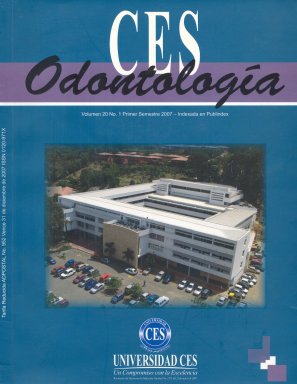Evaluación de conocimientos en salud bucal de los acudientes al programa “SIPI”, en una IPS de Medellín, 2005.
Resumen
Introducción y Objetivos: Los Programas de Salud deben involucrar al individuo y su familia en el entorno que se desenvuelven y más cuando se presentan realidades socioculturales diversas. En este sentido el programa de salud integral para la infancia (SIPI) brinda una base educativa multidisciplinaria en áreas de la salud, que orienta a los acompañantes de la población infantil de 0 a 5 años en el fomento de hábitos saludables desde los primeros años de vida. Materiales y Métodos: El propósito de este estudio fue evaluar el conocimiento adquirido en salud bucal de 178 acudientes que asisten al SIPI durante el primer año de vida del niño en una IPS de Medellín, por medio de una encuesta de percepción que constó de 10 preguntas de información personal y acerca del programa, y 10 de conocimientos sobre salud oral. Resultados: La charla educativa se considero como el método didáctico mas utilizado para impartir conocimientos en salud bucal (77%). El 70.9% de los acudientes del grupo de 10–12 meses tuvieron un nivel bueno de conocimientos, el grupo de 7-9 meses presento un nivel de conocimientos buenos (66.6%) y al tiempo el mayor nivel de conocimientos malos (17.9%). Conclusiones: Los conocimientos adquiridos durante el programa fueron similares independiente del grupo de edad del niño; las respuestas estuvieron basadas en conocimientos previos a la participación del mismo, por ello se le debe dar un mayor protagonismo en el programa al área de salud bucal. Abstract Introduction and objectives: The Programs of Health should involve to the individual and their family in the environment that you/they are unwrapped and more when diverse sociocultural realities are presented. In this sense the program of integral health for the childhood (SIPI) it offers a multidisciplinary educational base in areas of the health that guides the infantile population’s companions of 0 to 5 years in the development of healthy habits from the first years of life. Materials and methods: The purpose of this study was to evaluate the knowledge acquired in buccal health of 178 companions that attend the SIPI during the first year of the boy’s life in a health provider institution of Medellín, by means of a survey of perception that consisted of 10 questions of personal information and about the program, and 10 of knowledge it has more than enough oral health that you/they were classified in the following age groups: 1-3 months, 4-6 months, 7-9 months and 10-12 months. Results: The educational chat you considers as the didactic but utilized method to impart knowledge in buccal health (77%). With regard to the knowledge 70.9% of the companions of the group of 10-12 months they had a good level, the group of 7-9 months presents a level of good knowledge (66.6%) and at the time the biggest level of bad knowledge (17.9%). Summations: The acquired knowledge during the program were similar independent of the group of the boy’s age; and according to the results one can say that the answers were based on previous knowledge to the participation of the same one, in and of itself a bigger protagonism should be given in the program to the area of buccal health.Descargas
Los datos de descargas todavía no están disponibles.
Descargas
Cómo citar
1.
Colonia AM, Gutiérrez GE, Hincapié JL. Evaluación de conocimientos en salud bucal de los acudientes al programa “SIPI”, en una IPS de Medellín, 2005. CES odontol. [Internet]. 9 de diciembre de 2008 [citado 18 de abril de 2024];20(1):33-8. Disponible en: https://revistas.ces.edu.co/index.php/odontologia/article/view/130
Número
Sección
Artículo de Investigación Científica y Tecnológica
| Estadísticas de artículo | |
|---|---|
| Vistas de resúmenes | |
| Vistas de PDF | |
| Descargas de PDF | |
| Vistas de HTML | |
| Otras vistas | |



